Is There a Disconnect between Torah Learning and ... - Hakirah.org
Is There a Disconnect between Torah Learning and ... - Hakirah.org
Is There a Disconnect between Torah Learning and ... - Hakirah.org
You also want an ePaper? Increase the reach of your titles
YUMPU automatically turns print PDFs into web optimized ePapers that Google loves.
<strong>Is</strong> there a <strong>Disconnect</strong> <strong>between</strong> <strong>Torah</strong> <strong>Learning</strong> <strong>and</strong> <strong>Torah</strong> Living? : 35<br />
<strong>and</strong> not live up to those principles.” 37 This is not to say that moral<br />
reasoning is not important. It is actually very important. 38 It is not<br />
enough, however, <strong>and</strong> by itself it will not guarantee better moral<br />
behavior. <strong>There</strong> are a number of reasons for why this is so. We will<br />
point to two:<br />
• The importance of authenticity in the teaching of morality.<br />
• The importance of empathy <strong>and</strong> emotional involvement in<br />
moral development <strong>and</strong> motivation.<br />
Authenticity:<br />
In the Jewish world there are a few “middos programs” on the market.<br />
Best known of these programs is the Derech Eretz program developed<br />
in Toronto. A number of schools have also created their own middos<br />
programs in which children are taught the basic values <strong>and</strong> halachos<br />
that underlie proper middos. At the root of these programs lies the<br />
belief that learning about middos will improve middos (just as in<br />
Kohlberg’s approach). Children are taught halachos in areas like kibud<br />
av v’em, ve’hodarto pnei zakein, kavod ha’briyos <strong>and</strong> the like. No less than<br />
with teaching the halachos in other areas of life, teaching these halachos<br />
is of utmost importance. However, just as in other areas of halacha,<br />
if, after the rebbe has taught a halacha, the talmid observes the rebbe<br />
ignoring it, or if after teaching the halacha, the rebbe states that<br />
37 Cited in Bee & Boyd ibid, p. 356, from Kohlberg, L, “The Cognitive-<br />
Developmental Approach to Moral Education,” Phi Delta Kappan, pp.<br />
670–677.<br />
38 Our entire education system, with our tremendous emphasis on<br />
learning <strong>and</strong> mastering the thought processes of Chazal, aims to<br />
develop a mind disciplined in considering ethical <strong>and</strong> moral issues <strong>and</strong><br />
adjudicating them following the principles of halacha. It is important<br />
that our children develop the ability to think. Only if we encourage<br />
them to think independently <strong>and</strong> to apply their learned “disciplined<br />
habits of thought” to everyday life will our education have its desired<br />
effect. If all they learn to do is repeat mantras <strong>and</strong> codified renditions<br />
of other people’s thinking, they will not develop the ability to think<br />
about ethics <strong>and</strong> to arrive at ethical imperatives for their actions <strong>and</strong><br />
behavior.
















